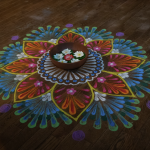KABELO MOTSOENENG ’20
OPINION EDITOR
We met on a scathing hot August afternoon in 2016. You had sunglasses on, wore an almost oversized blue-and-white t-shirt, colorful shorts and boat shoes. I didn’t know how your eyes looked like — I suspected that they were small and beautiful; but you noticed the nervousness in my eyes, though you didn’t bother to ask about it.
I was walking ahead of you when you rushed to ask me where I was from. “Johannesburg, South Africa” I said, making sure that I uncolored my South African accent. I said this though I knew most people were interested in the “Africa” part and not the “South” part; but you were so curious about the world and told me about South Africa’s major cities you had known about. You were impressive.
We exchanged names. “X,” you said; there was confidence in the way you said your short name, in a way that exuded sureness about your place on this campus, this country and the world.
I admired how easy it was to know you. Though I never did consider you a friend because that’s a difficult thing to assume of any heterosexual man I met — they are friends until they declare themselves as friends. You never did. So I took that we were acquaintances. It did not bother me at all; in fact, you said you liked how carefree I was and how I took the world too serious. We laughed about that but I never understood what it meant.
We were in the library one night, doing homework together. Our mutual friend was also there, she understood you better than I did. You came out as feminist that day. You mentioned your love for women of color though I was suspicious of what you meant by loving women of color; I wanted to know if you cared about their place in the world at all. But you mentioned how you also dated women of color. Like the girl who was a junior that year and she rejected you. You sent me a message on Snapchat calling her the b-word. I said that was unfeminist and it seemed to puzzle you. It also puzzled you when I said the story you had written was sexist and that it objectifies women — yet, I encouraged you to continue writing.
You knew that I am a gay man. You mentioned that you were an ally and that you have “lots of gay friends.” In fact, you mentioned how you were curious yourself. I encouraged you to be yourself without any apology because that’s how I live my life.
I encouraged you to be unapologetic about your Asian culture and heritage because I understood how difficult it was for you to be an other in a white American culture. But it was whiteness you were after. It was white male-hood that mostly wooed you and floored you.
You are the second man to have violated my body. I will not tell you about the first one because he was the person I loved and trusted deeply. A person I felt safe with. But you were an acquittance that I felt safe with.
I remember that April evening when you did what you did. I froze and felt something inside me collapse. I was angry and ashamed. I thought I had done something to encourage your behavior. I did what most people who go through this do: I made excuses for you. First I said it was my fault because I wore pants that were too tight for a boy. Then I blamed myself for acquitting myself with a man of color of who lusted after whiteness. Then I drank too much because I did not want to remember things done to boys with bodies like mine.
In our sophomore year, you lived on the same floor as mine and your room was opposite to mine. I did not tell anyone about what you had done, besides my therapist, of course. She asked if I wanted to get some administrators to look into it — I denied. You see, I thought I was strong enough to let what you had done to me pass with time. So I continued to be afraid, at night and day, because I felt unsafe.
There are some administrators who tried to reach out once they found out about this case — I declined their help. I declined it because I still do not have the language to articulate this violence. I declined their help because I—am—was ashamed: how does a man violate another man? But I also know sexual violence is an inaction of power and dominance. That men violate men who seem like they don’t have the same power as them. Women are raped because men think they have power over their sexuality. Men sexually violate other men because their masculinity is superior to others — sexual violation reinforces that.
I also declined their help because I still felt for you. Not in a romantic way because I respect myself too much for that. I felt for you because you’re a version of manhood in American and global culture that has been seen as inferior. I felt for you because I was scared that you might lose your place at this school. I felt for you because you’re an immigrant in this country and I had to be loyal.
But I am informed enough to know that I am not the only one you had violated and whose trust you have broken. I know of the women who have graduated and said that you took advantage of them. I also know that men like you think women and queer folks are always available for their experimentation, as we’re disposable things. I am informed enough to know that patriarchal violence thrives on a code of unfounded loyalty and silence.




+ There are no comments
Add yours